By Kim Campbell, Year 5 /6 Teacher
Background
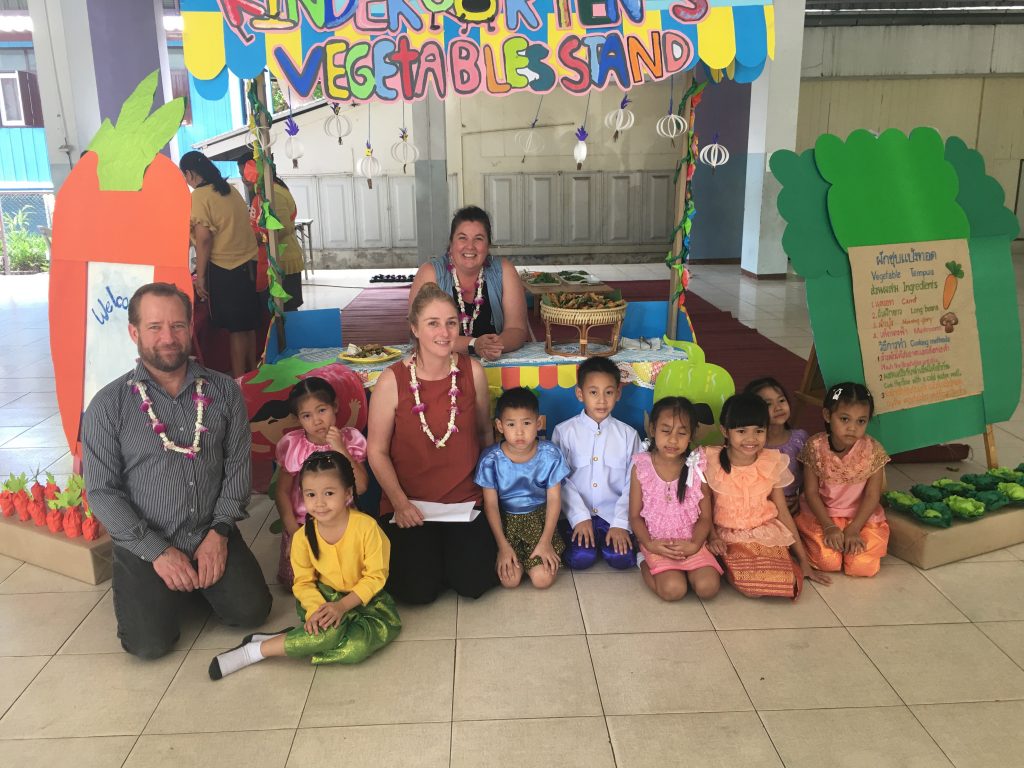
Between 2016 and 2018, the Thai Civic Education Centre (supported by the Friedrich-Ebert-Stiftung Thailand and Monash University, Australia) organised the project “Enhancing Thai Democracy through Education Links to Australia”. The Faculty of Education at the Monash University and Chulalongkorn and Mahidol Universities in Thailand co-administered the project.
In 2016 and 2017, two groups of Thai teachers visited Australian schools to observe and participate in Civics and Citizenship Education (CCE) lessons in which they had an opportunity to discuss teaching methods and the curriculum content.
In the final year, Australian CCE teacher-educators and CCE classroom teachers visited schools in Thailand between 2-6 July 2018, led by Drs. Marc Pruyn and David Zyngier from Monash University. Kim Campbell was one of these visitors and these are her reflections.
A Trip Abroad
I travelled to Thailand with the two lecturers from Monash University and two other Victorian teachers from John Monash Science School and Elwood Primary to support the Thai Civic Democracy Project. The project’s purpose was to improve the teaching of Civics and Citizenship Education (CCE) in Thai schools.
Censorship is very real in the lives of ordinary Thai citizens, many of whom remain unfamiliar with the history of protest in their country. In Australia, after I teach a session about politics, I go home hoping that it has resonated with the kids. As I was to learn when I visited the Institute for Human Rights and Peace Studies at Mahidol University, in Thailand, teachers put their own safety and that of their families at risk whenever they introduce politics or challenging issues such as LGBTQ, women’s and environmental issues.
It was my privilege to listen
Teaching with guards stationed in their classrooms, was a common experience for many Thai educators. I was to learn during a university visit from a documentary of the country’s political struggles for democracy during the 1970s. A massacre of between 46 and 100 demonstrators had ensued, killed at Thammasat University campus on 6 October 1976. “This is the first I knew that these things had happened in my country” confided one of our guides, a university-educated person. Insights such as these highlighted for me just how important Civics and Citizenship education was in the lives of my Thai colleagues and why they saw it as an area that they want to develop, right from early years of education.
In essence, it is the aim of the Thai Civic Democracy Project to implement effective Civic and Citizenship education practices. The Friedrich Ebert Foundation, together with Monash University has been bringing Thai educators to visit Victorian schools noted for their innovative Civics and Citizenship programs. Visiting teachers come from many different regions of Thailand and when they return, there is an expectation that they will facilitate Professional Development sessions and mentoring for other teachers in their area. When in Australia, the Thai educators also attend sessions at Monash University run by Senior Lecturer, David Zyngier, an internationally respected Civics and Citizenship researcher and teacher-educator.
On the 2018 leg of the program, we visited Thai schools to see the implementation of the project. From there, Thai colleagues invited our feedback, as well as answers to any questions they might have about the subject.
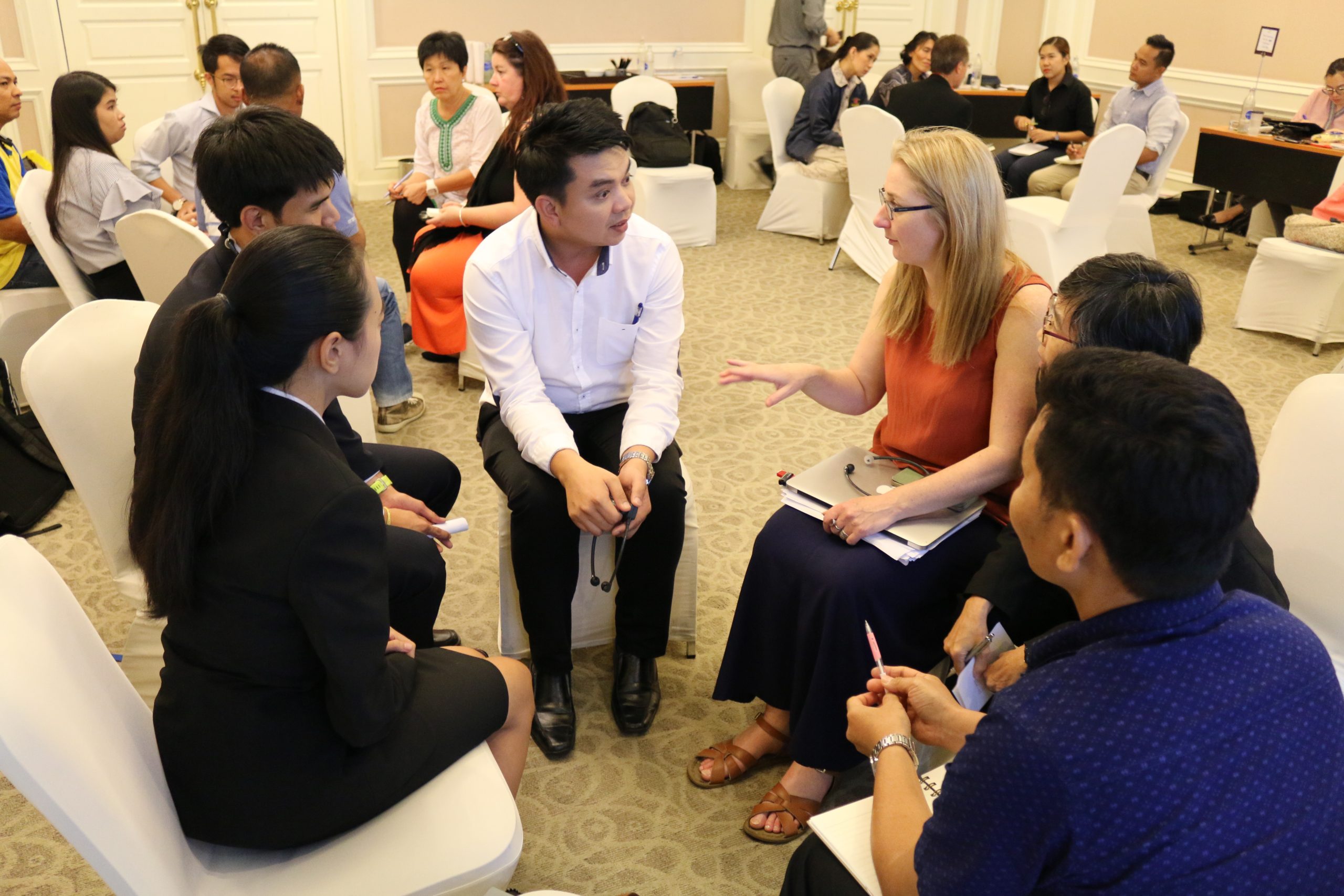
Wooranna Park! Wooranna Park!
Many of the practices that I observed were strategies that would seem quite conventional in Australian schools. Strategies such as Think-Pair-Share and group projects, however, which seem to us unremarkable, are some of the most foundational ways that Thai colleagues are giving their students more voice and active participation in their learning. Listening to students and considering their opinions also familiarised them in learning in more democratic ways. In fact, the struggle for those teachers with whom I spoke was not which teaching strategy to use, but how they might bring the ideals of Civics and Citizenship alive under the strict limits of a prescribed curriculum.
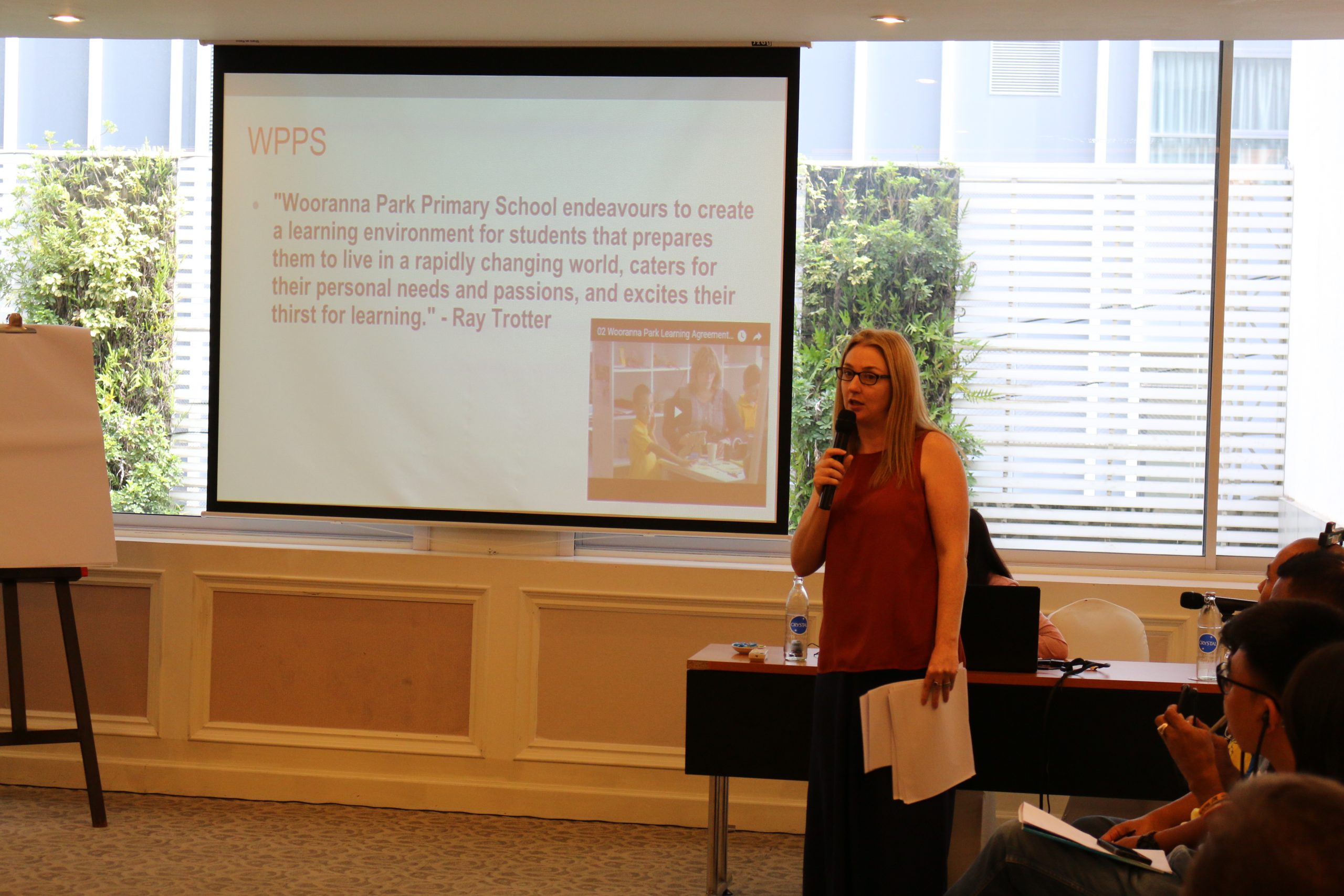
After many rewarding observations, our interactions with Thai colleagues culminated on the last day with us facilitating a day of Professional Development. There, we each delivered a presentation on how Civics and Citizenship were being implemented in our own schools. It was remarkable for me to experience how I was acknowledged with broad smiles and adulations of “Oh, Wooranna Park, Wooranna Park.”
Describing what we do
I know that there’s interest in our work from other countries. We reflected on it with our principal, Ray Trotter. Now, I finally understood his meaning. Other educators were watching us. For instance, I came to learn how Thai educators visiting Australia compiled a report on what they had seen in Australian schools. Astoundingly, the majority of the images in the report were of learning spaces at Wooranna! Furthermore, Thai educators would request a debrief with teacher-educator, David (Zyngier) to thoroughly discuss what they’d observed at the school in order to work out how they might implement Wooranna practices in their own schools.
I can’t tell you how it filled me with pride to know that people had such high regard for our school. During my time at Wooranna, I’d experienced many visitors walking through our school but I’d often wonder what they were making of what they saw. How were their perceptions matching up with what we were really doing? However, my visit to Thailand allowed me to reaffirm the value of collegiate reflections around “Why are we doing it that way, and what does that lead to?” It is at that moment that we are all part of changing things for the better.
A democracy is more than a form of government; it is primarily a mode of associated living, of conjoint communicated experience.
John Dewey, The Democratic Conception in Education (1916)
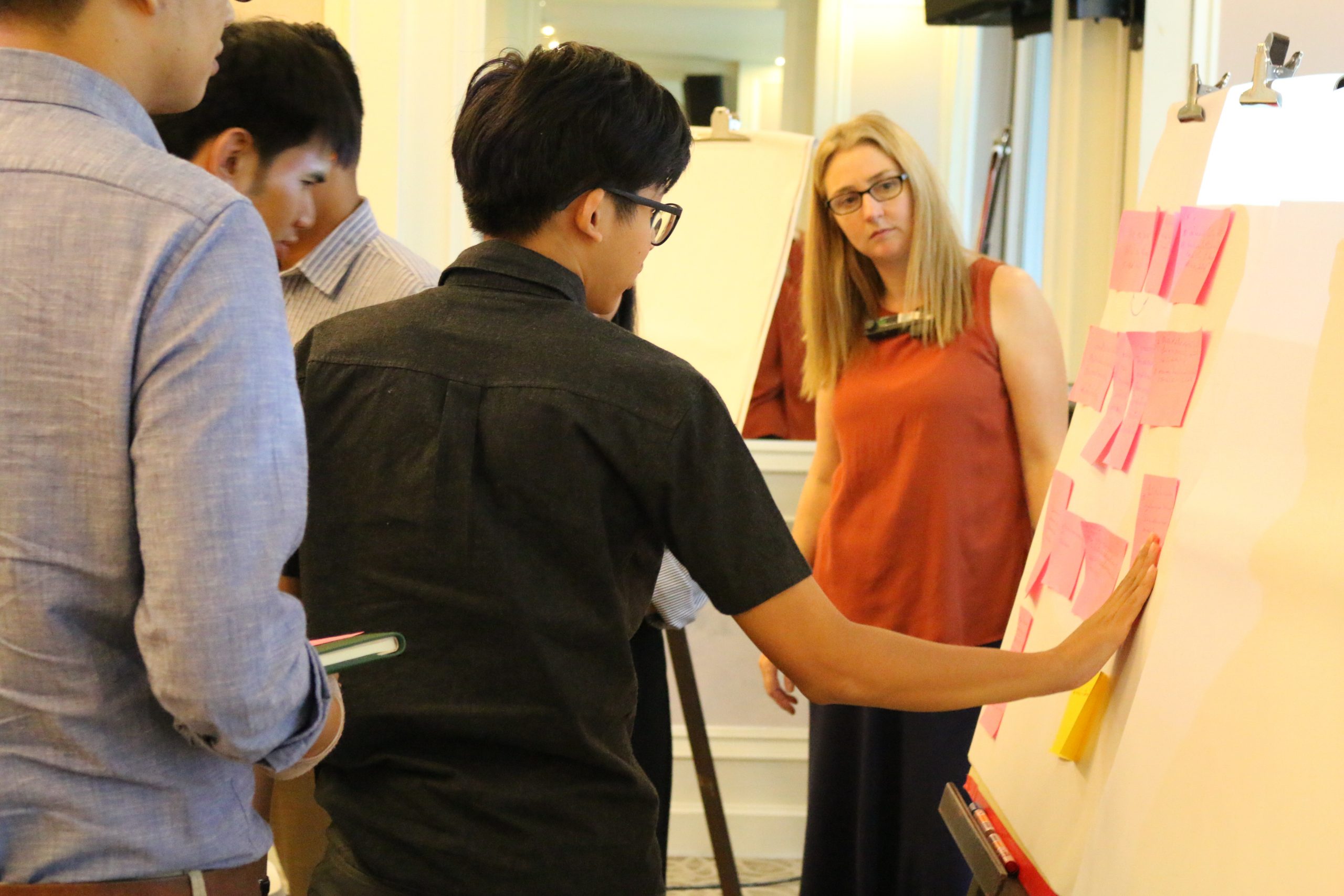
Seizing the moment
Prior to the trip, I was worried about my lack of experience in presenting to large audiences. I was only too aware that I had only been teaching for six years, and my self-talk filled me with doubts about whether I was the best person for demonstrating Wooranna’s practices abroad. However, as I took stock of how my colleagues at Wooranna Park teach Civics and Citizenship, I noticed that our decision to NOT have a weekly block of learning labelled ‘Civics and Citizenship’ allowed us to interweave the CCE curriculum content into our school’s democratic culture.
I was then able to further realise that our Raison D’etre really does underpin our practice in ways that I was not previously conscious. Therefore, just the process of preparing for the trip has allowed me to see how CCE connects and underpins everything we do. That meant that we were not just paying lip service to the development of student agency. As a result, I found myself feeling increasingly honoured to learn from all of the teachers who work there.
Consequently, I found that I was able to respond to most questions that were thrown at me. When I had no personal experience to draw on, I found myself channelling my peers and mentors. I drew on so many things that I had unknowingly been absorbing over the years: the way that Assistant Principal Jennie Vine placed questions about pedagogy before teachers, how Lucia Hetherington worked with the Student Council Representatives in interdisciplinary and project-based learning, how Jess Waters achieved community engagement and Vicki Ross championed approaches to social justice advocacy. These examples were just some of the many examples I cited.
What we take for granted
I realised that the Wooranna Way has become a defining part of my identity as a teacher. If someone said to me, “Okay, we’re reverting back to a conventional timetable. You’re going teach a math class followed by an English class, followed by a maths class, followed by a this-and-that class, and you need to stay strictly on the prescribed content,” I don’t know how I would motivate myself to teach with passion and conviction. The experiences in Thailand really highlighted for me just how much I endeavoured to work with the whole staff at Wooranna to develop the students’ as life-long autonomous learners.
So, when I heard the story about a child from another school who hated doing geography even though he had travelled extensively around Australia with his family, I reflected on why the situation wouldn’t arise at Wooranna. On probing why, I was told that his boredom was due to the fact that his experience of the subject consisted of the ‘teacher telling kids stuff, followed by a worksheet’. Contrast this with how geography is taught at Wooranna, for instance, the students in Grade 2 were given their own ‘passport’ which meant that every week they ‘travelled’ to a different country. While I wasn’t teaching the class, I nonetheless knew all about what the children were learning because they were so excited to be engaged in their lessons that they would tell any passing teacher about their work.
Igniting minds to learn
It was an amazing thing to observe how the teacher engaged the students so deeply while still managing to structure content from the formal curriculum: Geography, together with Intercultural and Ethical Understandings, political issues and, most crucially, the basics of, Maths and Literacy. They weren’t just ‘doing’ geography, they immersed themselves in it. And that was the message I wanted to get across to my colleagues in Thailand. You don’t have to add Civics and Citizenship or Democracy into your already crowded curriculum. Learning in other areas of the curriculum can be enhanced and deepened by integrating concepts around pedagogical practices that maximise ‘serious’ play and immersive learning environments.
At the same time, I pointed out that we still had challenges at Wooranna when we faced educational imperatives like NAPLAN tests. “Why aren’t the results better?” I explained that we live with the fact that standardised tests don’t measure what we value as a school. One teacher seemed to understand what I was saying when he compared doing ‘geography’ and leaving aside ‘social justice’. When I followed up with a suggestion of how he might choose a novel which allowed students to explore geography and social justice simultaneously, he politely clarified, “But I have to do it this way.” It was a humbling experience which made me appreciate that, like all teachers, they are making changes, a little at a time and relying on each other’s passion to gradually make even bigger ones.
There are no neat solutions
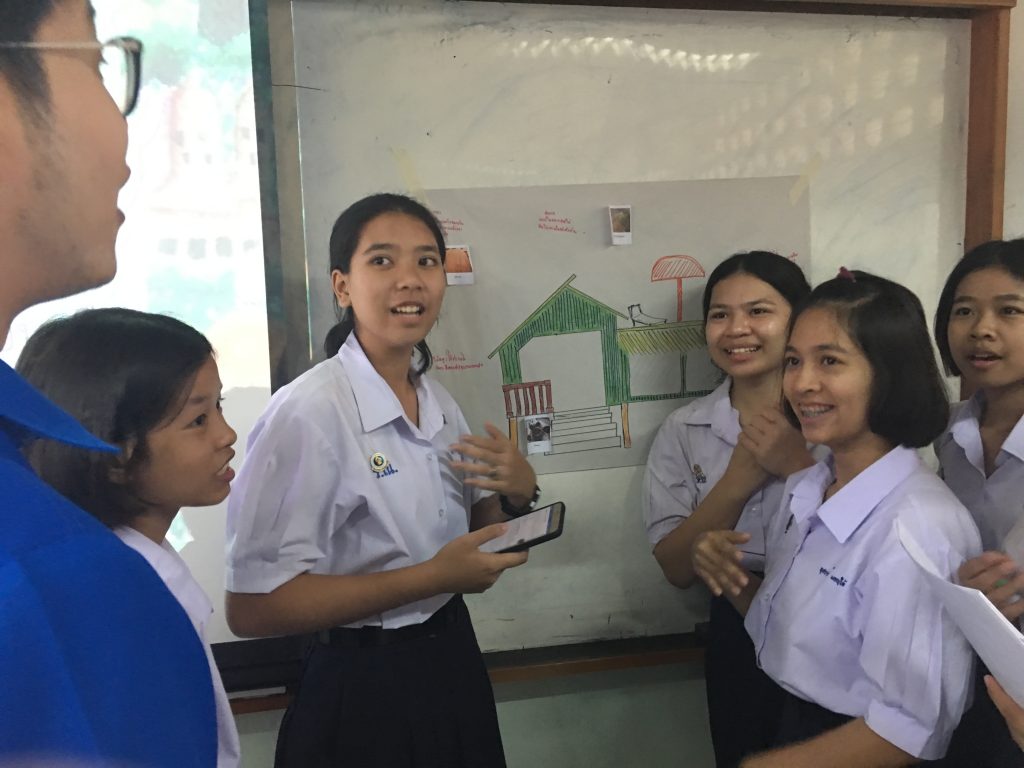
It wasn’t difficult to share with Thai educators, therefore, that despite our innovative ways, Wooranna still faced many of the same problems that schools everywhere fight against. For example, last-minute unscheduled disruptions or even great opportunities that arrive out of the blue! So much to do, so little time to do it!
Sometimes after we change plans in response to a student-led question or issue, I ponder whether we should have stuck with the original plan. But then I realise that not following a child’s interest or an in-the-moment-vital-happening would stop students achieving some even richer outcome. Take, for instance, the day the gay marriage bill was passed in the Australian Federal Parliament and we decided to watch the whole parliamentary session.
Yes, at the time, we were meant to be doing something else, but we decided to put it aside because of the importance of a bill that would have a real and direct impact on our students. The subject would shape their future sense of self, together with their sense of belonging and the power of politics to change lives.
Mathematically speaking, the event was also a good opportunity to marshall the incidental learning around the statistics involved in voting, something which was continually being referenced in the News. Interestingly, as I discussed the topic of dealing with school timetables and how we ‘covered’ subjects at Wooranna, one of the Australian teachers who was travelling with me pointed out, “Your school is doing things I haven’t even thought of doing. Australian schools need to come and learn from you.” Ironically, I felt the same about many of the things she had presented during the tour.
There are so many innovations and strong practices happening in Victoria. Learning from one another is great professional development, moving us all away from teaching practices that no longer serve the purpose of preparing children for the future.
A concluding note
Ultimately, I emphasised to Thai educators how at Wooranna we plan everything. We sit and have a massive discussion about what we’re thinking as teachers, after firstly interviewing the children each year to plan our programs.
What have they been proud of doing during the year? What do they want to do? What are they interested in? What are they passionate about? Then we identify what common areas the children have, and then we talk to our students again. We layer our work – what are the big ideas that are coming through that we want to keep growing? We come up with our key understandings.
Such planning takes a long time. We set down all the things we want to get to. All the key questions we want them to understand. And this is not all of it. How we are going to do it through our Literature Circles, Enigma Missions and Learning Symposiums, symposiums that are a great way in which we share ideas. We plan workshops and assessments.
Democracy is born in the passion of waking up children to know that they have a responsibility to be the best learners they can be.

